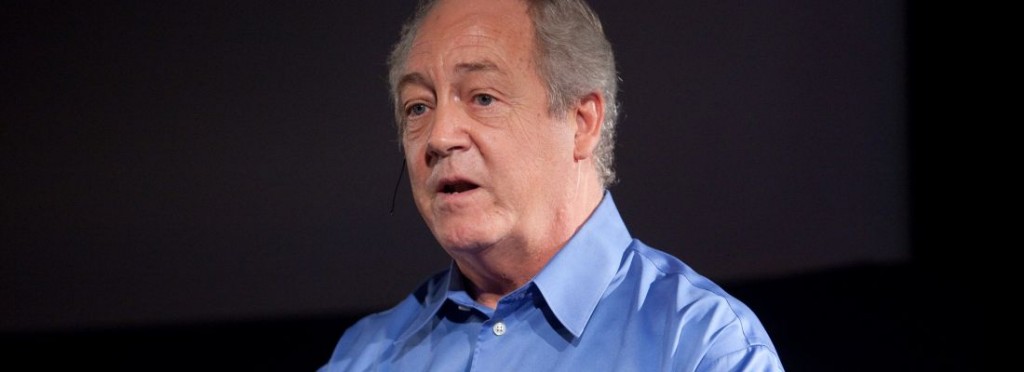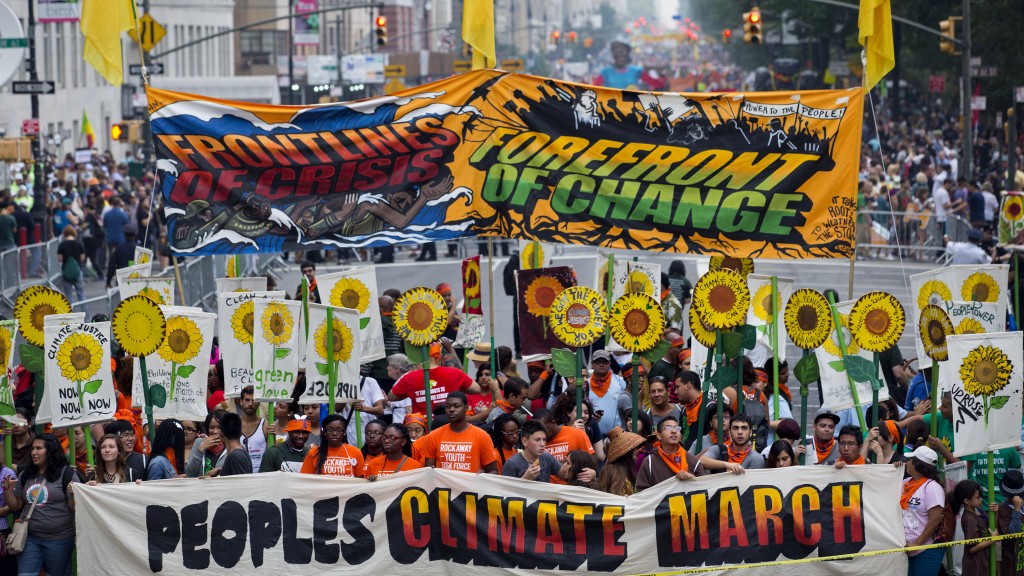Former self-described “radical environmental activist” Dr. Patrick Moore tells Oil & Gas 360® why he left Greenpeace:
-
Teaching kids that humans are bad and that we are the enemies of the earth is an extremely self-defeating and scientifically incorrect concept
-
The climate change movement is fueled by fear and fundraising
Oil & Gas 360® interviewed Dr. Patrick Moore about his time in the early days of Greenpeace and what caused him to part ways with the organization. This is Part One of the exclusive interview.
OAG360: Can you just start off by telling us what prompted you to found Greenpeace or to be a part of that, and what was the original goal of the organization?
In the Beginning: Stop Nuclear Bomb Testing and Save the Whales
MOORE: I’d grown up in a very remote wilderness village on northern Vancouver Island, Winter Harbor, and I had to come to Vancouver to boarding school when I was fourteen, going to a one room schoolhouse by boat every day. Right after finishing high school I entered the University of British Columbia in science and it was the height of the Vietnam War in the mid-sixties, the height of the Cold War and the threat of nuclear war and the beginning of the emergence of the realization of the environment.
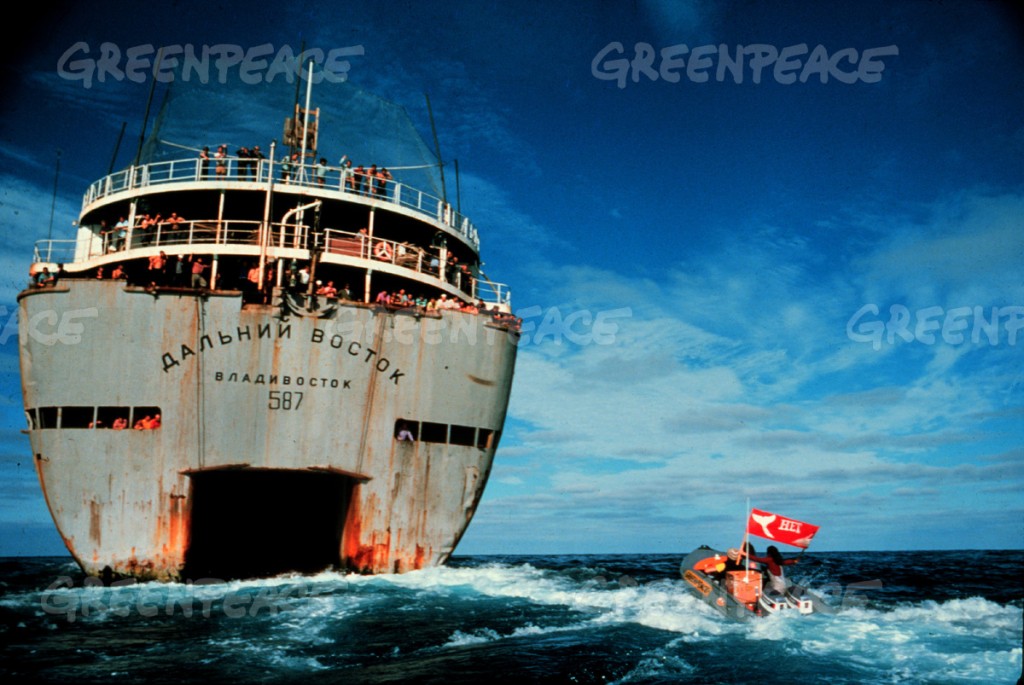
Greenpeace activists protest at the stern of whaling factory ship. (Greenpeace Witness book page 48-49) (Greenpeace Changing the World page 11 similar photo)
The sixties were a pretty big turning point for a lot of things and I was just swept up in that. By the time I enrolled after getting my Bachelor of Science in life science, by the time I enrolled in a Ph D. program in ecology in 1969, I had become what would be described as a radical environmental activist.
But actually the early group that formed Greenpeace was all professional people or like me, a Ph D. student in science. Greenpeace was a realization that peace and ecology could be joined into one movement and hence: green and peace.
Our first objective was to end the threat of all of nuclear war. So we chose as our target us hydrogen bomb testing in Alaska which was fairly close by. I joined this group that was still just a little committee in a church basement while I was doing my Ph. D. in ecology because I wanted to do something, rather than just study.
So we sailed a boat across the North Pacific in the fall of seventy one to bring attention to the nuclear tests and were very successful at doing so. And along with a lot of other people we were kind of the spearhead of a movement.
It resulted in President Nixon canceling the remaining tests; I mean there was no end to them. Canceling the nuclear testing program in Alaska: that was the beginning of Greenpeace and then we went on to two years’ campaigning against French atmospheric nuclear testing and as a result of our campaigns, France was eventually forced by international opinion to go underground with their nuclear tests in the South Pacific. So we won another round there and then we just completely changed course.
That was much to the surprise of our “peacenik” element who did not understand why saving whales was of any importance or why a group of us younger, more green-oriented types thought that that would be a really good thing to do. So we made four voyages into the Pacific against the then Soviet and Japanese whaling fleet, and we brought an end to factory ship whaling in the world.
OAG360: So what changed for you personally and for the organization Greenpeace?
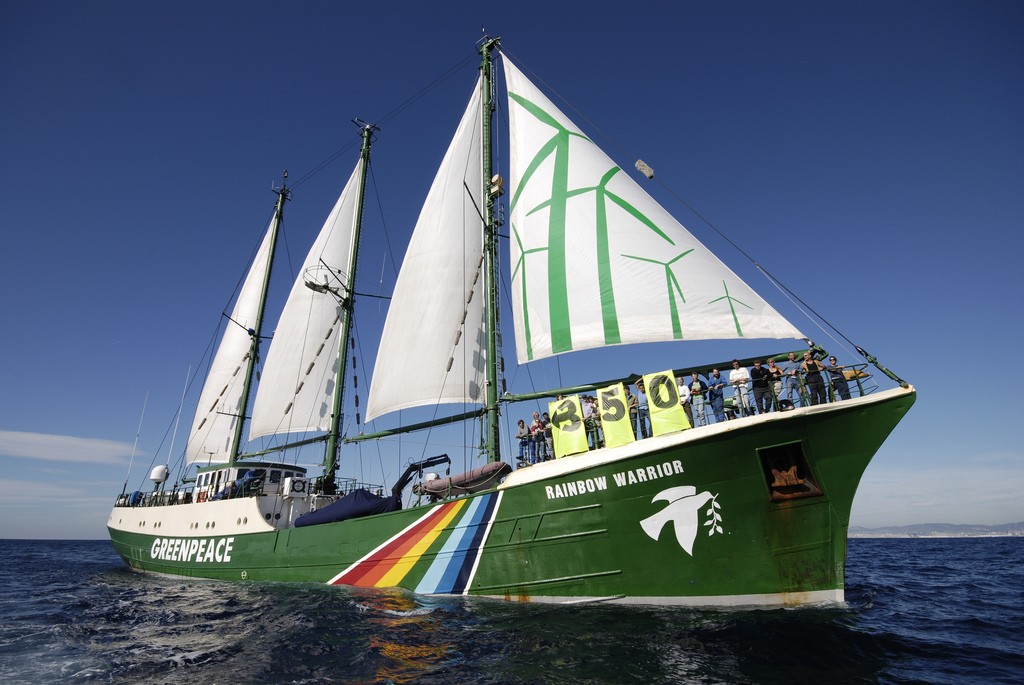 I went on in Greenpeace to create Greenpeace International in 1979 which was an out of court settlement of a copyright lawsuit that we filed against the U.S. [Green Peace] organization that was trying to break away and take our name and history with it.
I went on in Greenpeace to create Greenpeace International in 1979 which was an out of court settlement of a copyright lawsuit that we filed against the U.S. [Green Peace] organization that was trying to break away and take our name and history with it.
And so Greenpeace International was formed, which kept the organization whole. I became one of six international directors for the next six years and continued campaigning on all kinds of other issues. I led the campaign to stop the capture of live Orca whales in British Columbia, which we succeeded with in 1981. I also led the campaign to stop trophy hunting in [Canada’s] provincial parks.
But by the mid-eighties a number of things had happened. First the whole environmental movement including Greenpeace had sort of gone from a humanitarian-oriented campaign to stop all of nuclear war and the destruction of human civilization, to saying that humans are the enemies of the earth, the enemies of nature and it would probably be a good thing if there weren’t so many of us and if we didn’t have so much technology.
Humans Are Not the Enemy
Arguments that basically reinforce the idea that humans are separate from nature, that humans have all of the bad and that Nature has all the good in it. It’s kind of a new version of original sin that started coming out in the mid-eighties, and I don’t think that way.
I know I’m an ecologist and that all nature is one, that we evolved from nature and we are part of nature as much as every other species. Teaching kids that humans are bad and nature is good and that we are the enemies of the earth is an extremely self-defeating and scientifically incorrect concept.
So that was the overarching reason why I started to feel like I should get out of it.
Banning Chlorine Worldwide Has Consequences
The real clincher came when my fellow directors decided to launch a campaign to ban chlorine worldwide. And just coincidentally I ended up being the only international director with a formal science education. The others were legitimately political activists or social activist entrepreneurial types looking for a position in this new industry called Environmentalism that would give them a career and a pension. Greenpeace adopted a pension two months after I left, so I my reaction was – I got out just in time.
I did not think that I was in it to be a lifer. I saw the environmental campaigns we were doing as more of a task force rather than a permanent committee. Because once you once you get the job done, you don’t have to keep beating your head against the wall, because you succeeded.
Fear of success was a motto that Ben Metcalf, an early Greenpeace brilliant guy, taught us. There’s a lesson there because when you succeed all of a sudden it’s a whole new world and you [must] change your approach to the new reality of the fact that you’ve actually won.
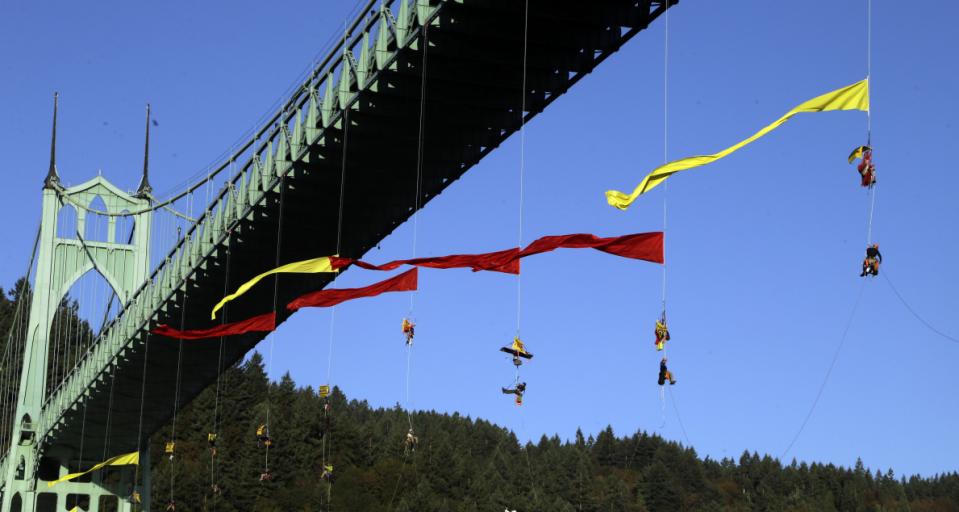
Photo: AP – Greenpeace protesters attempt to block Shell Arctic drilling support vessels from leaving Oregon; Judge issues contempt fines.
Then there are a lot of these people who just wanted to keep beating up against the man for the rest of their lives, even though they’d won. There was always something next that they demanded. And that meant that once we had convinced people about some of the key issues that needed to be resolved, that didn’t stop these people. They kept becoming ever more extreme in their demands–eventually abandoning science and logic all together, taking zero tolerance positions. “We must work for zero emissions; we must not have one nuclear power plant; we are zero tolerant on all kinds of chemicals,” even though some of them might have a perfectly good [humanitarian] use.
All of a sudden it was “ban chlorine worldwide” based on the fact that many chlorinated hydrocarbons like D.D.T., dioxin and P.C.Ps are considered toxic. But even those are toxic only under certain circumstances.
 D.D.T. has thankfully been brought back as a weapon against malaria by the World Health Organization and USAID, because they finally recognized that people were dying unnecessarily, and that they had actually stopped using the most effective way to prevent malaria, which is to kill mosquitoes with D.D.T.
D.D.T. has thankfully been brought back as a weapon against malaria by the World Health Organization and USAID, because they finally recognized that people were dying unnecessarily, and that they had actually stopped using the most effective way to prevent malaria, which is to kill mosquitoes with D.D.T.
A Dumb Idea: Insisting on Zero Tolerance for an Element in the Periodic Table
I argued long and hard that not only was it was a dumb idea to have a zero tolerance policy against one of the elements in the periodic table, but that chlorine was in fact the most important element for public health and medicine. Because adding chlorine to drinking water is the biggest advancement in the history of public health, and most of our synthetic pharmaceuticals are based on chlorine chemistry. They didn’t care about that. It all sort of ties into this anti-human attitude and I just went, “you know what, this is definitely not for me anymore.”
CO2 Greenhouse Gas Issue is Worth Studying, but the Alarmists Took it Over
There wasn’t a climate change issue when I left Greenpeace. It was just beginning to emerge but it wasn’t a campaign in the mid-late eighties. A few years after I left Greenpeace when that issue surfaced, I became newly involved in it and studied it and formed a big committee here in British Columbia under the money from the B.C. Science Council to look into it and try to find consensus on the subject.
And so we brought together all of the emitters, all the regulators, and all the sequesterers of CO2 in British Columbia. Greenpeace even joined in because my old friend Jim Bohlen was still in there and we did a really good report on it. Since then I have been intimately involved on the climate issue on a daily basis.
Skeptical: is CO2 an International Emergency that Must Have Trillions of Dollars Thrown at it?
It wasn’t very long before I became skeptical of the growing alarmism around the subject. It was one thing in the early years to have this interesting possibility that CO2 is a greenhouse gas and would cause a warming of the climate. But alarmists came in just like they do in nearly everything. And if you don’t think something horribly catastrophic is happening, then they accuse you of denying the whole thing—denying that humans have any role whatsoever in climate, denying that that CO2 is a greenhouse gas, denying that it might cause warming—none of that is included in skepticism. What skeptics are skeptical about is that this is an international emergency that must have trillions of dollars thrown at it.
And so I’ve had that position for twenty years. But [it has fallen] on deaf ears to a large extent with the media in particular, and politicians, and of course the environmentalists, and green business that’s trying to raise grants to build things that would never be built if the markets were deciding it—like solar and wind for example. And scientists looking for grants. It’s interesting to note that well over ninety percent of the money that’s going into this climate research is public money.
Fear and Fundraising
There’s no useful product in climate change other than fear. Fear and fundraising. So there’s lots of money in climate change, but it’s all because people are pushing the line that it’s so terribly dangerous that we have to spend all this money in order to find out more about it. To have programs that are supposed to reduce the use of fossil fuels—none of which have been particularly successful. Because these same people tend to be against nuclear energy and hydroelectric power, even arguing that hydroelectric isn’t renewable and arguing that nuclear is too dangerous and too expensive. When in fact nuclear, on a kilowatt hour produced basis, is the safest of all of that electricity generating technologies, and hydroelectric is driven by [nature].
 So you’ve got a completely dysfunctional framework here that evolved out of this completely dysfunctional self-interested clique of elites who are pushing the idea that human CO2 emissions are going to cause dangerous or catastrophic climate change. When there is, in fact, no evidence in the real world that that is happening.
So you’ve got a completely dysfunctional framework here that evolved out of this completely dysfunctional self-interested clique of elites who are pushing the idea that human CO2 emissions are going to cause dangerous or catastrophic climate change. When there is, in fact, no evidence in the real world that that is happening.
EDITOR’S NOTE: in related news, on Aug. 3, 2015, the White House issued strict national climate change rules through the “Clean Power Plan” and last week Washington’s Governor Jay Inslee announced his intention to take independent executive action to put in place a cap on carbon emissions in the state of Washington.
US judge rules Greenpeace in contempt in Oregon Shell Oil Protest
PORTLAND, Ore. (AP) -- A federal judge on Thursday ordered Greenpeace USA to pay a fine of $2,500 for every hour that protesters dangling from a bridge in Oregon continue to block a Royal Dutch Shell icebreaker from leaving for oil drilling in the Arctic.
There was no sign that the protesters were about to leave Portland after the ruling in Anchorage by U.S. District Court Judge Sharon Gleason that Greenpeace is in civil contempt.
Gleason in May granted Shell's request that activists protesting Shell's Arctic drilling plans be ordered to stay away from Shell vessels and beyond buffer zones.
Earlier Thursday, the Shell oil icebreaker Fennica retreated when activists dangling from the St. Johns Bridge over the Willamette River refused to leave and to let the vessel pass.
Protesters on the bridge and kayakers on the river have been blocking the icebreaker from heading to the Arctic for a drill operation.
It started its journey to the Arctic early Thursday before stalling in the face of 13 dangling activists linked by ropes. It turned around and inched its way back to Vigor Industrial's dry dock, delighting those gathered on shore in the city known for environmentalism.
"I think it's inspirational," Portland resident Lisa Szot told The Oregonian. "It's a really beautiful protest."
The icebreaker is a key part of Shell's exploration and spill-response plan off Alaska's northwest coast. It protects Shell's fleet from ice and carries equipment that can stop gushing oil.
Environmentalists hope to delay the ship long enough for winter weather to prevent Shell from drilling until 2016. By that time, they hope the Obama administration has a change of heart on the issue.
"There is no Plan B, just as there is no Planet B; we have no intention of moving until President Obama rescinds the permit for Shell to drill in the Arctic," said Daphne Wysham of the Center for Sustainable Economy.

